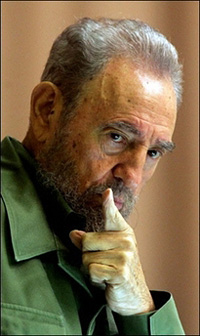 |
 |
 |
 News from Around the Americas | August 2006 News from Around the Americas | August 2006  
US State Department Predicts Beginning of the End for Cuban Regime
 Lesley Clark - McClatchy Newspapers Lesley Clark - McClatchy Newspapers


| | China has urged non-interference in the affairs of Cuba after US President George W. Bush offered US support to Cubans seeking democratic change following the hospitalization of Castro. (AFP/Adalberto Roque) |
Washington - A top State Department official conceded that the U.S. doesn't know much about Fidel Castro's health, but said Castro's decision to temporarily hand over power to his brother signals "the beginning of political change in Cuba."

Briefing reporters, Thomas Shannon, assistant Secretary of State for Western Hemisphere Affairs, likened the Cuban government to a helicopter - a "single fail-point mechanism."

"When a rotor comes off a helicopter it crashes," Shannon said. "When a supreme leader disappears from an authoritarian regime, the authoritarian regime flounders. It doesn't have the direction that it requires. I think that's what we're seeing at this moment."

Shannon said the fact that Castro has been absent from the world stage since the announcement early last week that he was ceding authority to his brother, Raul, suggests a "serious illness" and an attempt by the Cuban government to carry out a stable transfer of power.

"The lack of visibility, I think, indicates the seriousness of the condition," Shannon said. "But it also indicates, I believe, that an effort has begun to try to coalesce or foster some institutional transfer of power."

But Shannon predicted the regime would have a rocky time outlasting Castro.

"Ultimately, this transfer won't work," he said. "Ultimately, there's no political figure inside of Cuba who matches Fidel Castro."

Shannon's words were the most expansive U.S. government comments on Cuba since the news of Castro's health crisis broke more than a week ago. President Bush and Secretary of State Condoleezza Rice have urged Cubans on the island to push for democracy and Shannon pledged U.S. support for such efforts.

"Obviously, we, along with the rest of the world are looking towards Havana with great interest and expectation," Shannon said. "We don't know how events in Havana will play out in regards to the health of Fidel Castro, but it is evident that what has happened is the beginning of political change in Cuba."

Cuba Transition Coordinator Caleb McCarry noted the administration is looking to spend $80 million to boost democracy on the island by providing Cubans with access to information.

He said the Cuban government recently announced a crackdown on illegal satellite TV dishes that bring in foreign broadcasts, adding, "this is a regime which fears the free flow of information."

Asked if some of the money would go toward wireless technology or satellite dishes, McCarry declined to go into details but said the U.S. government is "committed to supporting the Cuban people, providing them with access to independent information to support their efforts to define a democratic future for their country."

"We don't imagine that a succession from one military dictator to another is an acceptable outcome," McCarry said.

Shannon and McCarry both suggested that the U.S. role is to do as much as it can to help dissidents on the island push for change.

"It's the Cuban people themselves who have to determine how they step out," Shannon said. "But what's evident, I think, is that despite the decades of repression that there obviously are Cubans in Cuba who are prepared to do it ... not only at risk to themselves, but at great consequence."

Yet Shannon acknowledged that the Cuban government's penchant for secrecy means the administration has little information on how ill Castro may be.

"We don't know how serious, we don't know what the level of recovery is," he said. said. "We're really not in a position to predict what the result of this is going to be." | 
 | |
 |



